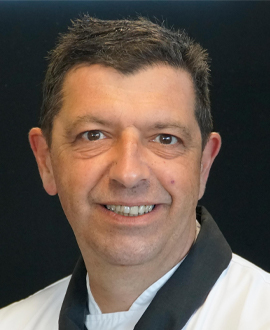What Does COVID-19 Recovery Look Like for New Zealand's Hospitality Industry?

Monday, 15 Jun 2020
By Toi Ohomai Expert:
Peter Blakeway, Chef Tutor
The biggest shake-up in the modern history of hospitality hasn’t arrived on the back of a new trend – it’s come via virus.
Toi Ohomai Chef Tutor Peter Blakeway says helping restaurateurs rebuild following coronavirus lockdowns will be a challenge for years to come.
“My focus is on helping to find the way forward for the hospitality industry post Covid-19. These are trying times and we will need a creative approach to visualise the way our industry will recover.”
One-hundred seventy-thousand people were employed in restaurants, bars, cafes, casinos and accommodation businesses across New Zealand last year; about 7500 of those were in the Bay of Plenty. Hospitality pumps billions of dollars into the Kiwi economy annually.
Blakeway has endured economic peaks and troughs during more than 30 years as a chef around the world. He started two businesses during global recessions, one in the early 90’s in Scotland, another in New Zealand at the start of the global financial crisis (GFC).
“Both times it was partly coincidence and partly conscious decision. To be successful at these times you have to be patient and resilient,” says Blakeway.
In addition to running restaurants, the chef has provided private catering and lessons for live crowds and TV audiences. Blakeway has also published a cookbook, written for newspapers and magazines and taught the Bay of Plenty Steamers and Super 14 Chiefs rugby teams to cook as part of a TV series.
A balance between innovation and tradition
He and other culinary professionals are teaching the next generation of chefs at Toi Ohomai. Students learn not only the basics, but also the artistry of cooking. Some dishes are part science project, part tasting platter, such as when dessert is served using liquid nitrogen and dry ice.
Blakeway and a team he calls “astonishing” opened seven pop-up restaurants in Tauranga’s CBD in one day and created a menu for the Ladies’ Long Lunch for charity – all using rescued food.
Today, Blakeway believes hospitality will rebound in a post-pandemic world.
“Culinary arts is a calling steeped in tradition and history; however, we must be careful that we don’t just preserve a historical artefact for the sake of it. Instead we must search to give our students what they will need for the industry that they arrive in.”
Resilience key to survival
Blakeway says careful planning can sustain businesses through turbulent times. “I had a chat to friends who have a restaurant in the Bay of Plenty recently to check they were okay. Their answer was after 30 years owning restaurants, they always planned for the worst winter imaginable and so were fine and just looking after their team and community.”
A New Zealand Restaurant Association survey in May revealed 89 per cent of members had experienced a downturn in business. Seventy-five per cent said they needed to cut staff to stay afloat.
Cafes, bars and restaurants can return to full capacity during Alert Level 1, free of single server and space restrictions of previous Covid alert levels. But Blakeway says a decade of shrinking margins will still mean casualties as the industry realigns itself. Long term, he says there will be the same amount of food to cook for roughly the same amount of people.
“Chefs are the experts at bringing these two together. The question becomes is a business resilient and agile enough to pivot into the temporary new normal across the next couple of years?”
Culinary arts history, says Blakeway, shows Nouvelle Cuisine emerged from the ashes of Europe after World War II; sharing plates and food trucks surfaced post-GFC. “Those were answers for their time. For us now the answers are out there, just not definable yet.”
Blakeway’s advice to students who’ll soon enter the hospitality field is timeless.
“Work hard and never stop learning your craft. Be brave and be patient, and plan to be resilient. Remember it is your generation that is going to change the world.”
While the chef says industry can seem locked in its own universe, its mission remains providing nourishment and connection.
“It is so much more than putting food on a plate. Be proud of the industry you are joining. We have a long history of survival and incredible creativity.”
